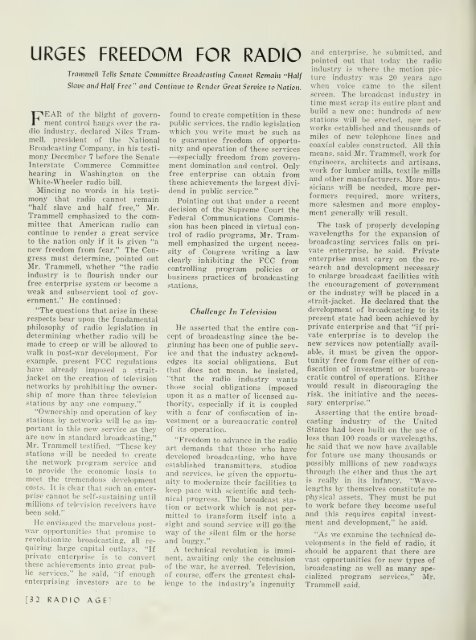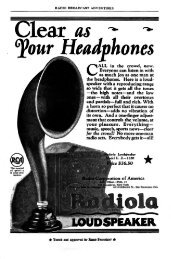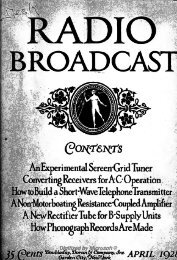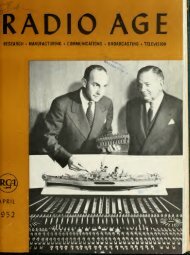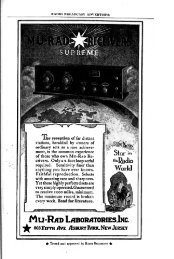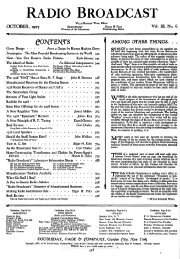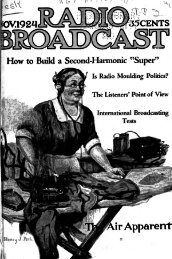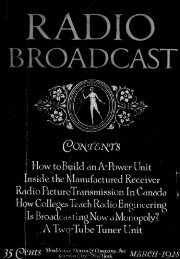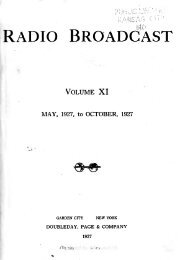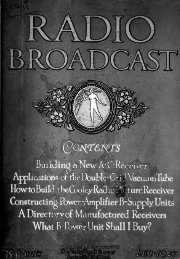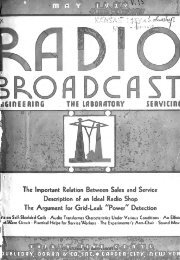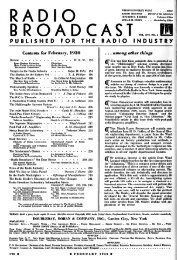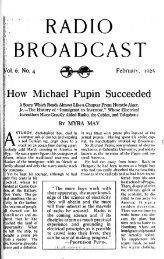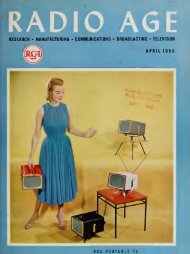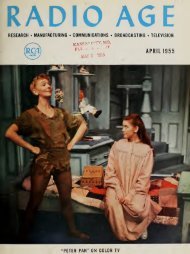Radio Age - 1944, January - 36 Pages, 3.3 MB ... - VacuumTubeEra
Radio Age - 1944, January - 36 Pages, 3.3 MB ... - VacuumTubeEra
Radio Age - 1944, January - 36 Pages, 3.3 MB ... - VacuumTubeEra
Create successful ePaper yourself
Turn your PDF publications into a flip-book with our unique Google optimized e-Paper software.
URGES FREEDOM FOR RADIO<br />
FEAR<br />
Tmmmell Tells Senate Committee Broadcasting Cannot Remain -Half<br />
Slaue and Half Free " and Continue to<br />
of the blipht of government<br />
control hanps over the radio<br />
industry, declared Niles Trammell.<br />
president of the National<br />
Broadcasting Company, in his testimony<br />
December 7 before the Senate<br />
Interstate Commerce Committee<br />
hearing in Washington on the<br />
White-Wheeler radio bill.<br />
Mincing no words in his testimony<br />
that radio cannot remain<br />
"half slave and half free," Mr.<br />
Trammell emphasized to the committee<br />
that American radio can<br />
continue to render a great service<br />
to the nation only if it is given "a<br />
new freedom from fear." The Congress<br />
must determine, pointed out<br />
Mr. Trammell, whether "the radio<br />
industry is to flourish under our<br />
free enterprise system or become a<br />
weak and subservient tool of government."<br />
He continued:<br />
"The questions that arise in these<br />
respects bear upon the fundamental<br />
philosophy of radio legislation in<br />
determining whether radio will be<br />
made to creep or will be allowed to<br />
walk in post-war development. For<br />
e.xample, present FCC regulations<br />
have already imposed a straitjacket<br />
on the creation of television<br />
networks by prohibiting the ownership<br />
of more than three television<br />
stations by any one company."<br />
"Ownership and operation of key<br />
stations by networks will be as important<br />
in this new service as they<br />
are now in standard broadcasting,"<br />
Mr. Trammell testified. "These key<br />
stations will be needed to create<br />
the network program service and<br />
to provide the economic basis to<br />
meet the tremendous development<br />
costs. It is clear that such an enterprise<br />
cannot be self-sustaining until<br />
millions of television receivers have<br />
been sold."<br />
He envisaged the marvelous postwar<br />
opportunities that promise to<br />
revolutionize broadcasting, all requiring<br />
large capital outlays. "If<br />
private enterprise is to convert<br />
these achievements into great public<br />
services," he said, "if enough<br />
enterprising investors are to be<br />
[32 RADIO AGE<br />
Render Great Seroice to Nation.<br />
found to create competition in these<br />
public services, the radio legislation<br />
which you write must be such as<br />
to guarantee freedom of opportunity<br />
and operation of these services<br />
—especially freedom from government<br />
domination and control. Only<br />
free enterprise can obtain from<br />
these achievements the largest dividend<br />
in public service."<br />
Pointing out that under a recent<br />
decision of the Supreme Court the<br />
Federal Communications Commission<br />
has been placed in virtual control<br />
of radio programs, Mr. Trammell<br />
emphasized the urgent necessity<br />
of Congress writing a law<br />
clearly inhibiting the FCC from<br />
controlling program policies or<br />
business practices of broadcasting<br />
stations.<br />
Challenge In Television<br />
He asserted that the entire concept<br />
of broadcasting since the beginning<br />
has been one of public service<br />
and that the industry acknowledges<br />
its social obligations. But<br />
that does not mean, he insisted,<br />
"that the radio industry wants<br />
those social obligations imposed<br />
upon it as a matter of licensed authority,<br />
especially if it is coupled<br />
with a fear of confiscation of investment<br />
or a bureaucratic control<br />
of its operation.<br />
"Freedom to advance in the radio<br />
art demands that those who have<br />
developed broadcasting, who have<br />
established transmitters, studios<br />
and services, be given the opportunity<br />
to modernize their facilities to<br />
keep pace with .scientific and technical<br />
progress. The broadcast station<br />
or network which is not permitted<br />
to transform itself into a<br />
sight and sound service will go the<br />
way of the silent film or the horse<br />
and buggy."<br />
A technical revolution is imminent,<br />
awaiting only the conclusion<br />
of the war, he averred. Television,<br />
of course, offers the greatest challenge<br />
to the industry's ingenuity<br />
and enterprise, he submitted, and<br />
pointed out that today the radio<br />
industry is where the motion picture<br />
industry was 20 years ago<br />
when voice came to the silent<br />
screen. The broadcast industry in<br />
time must scrap its entire plant and<br />
build a new one; hundreds of new<br />
stations will be erected, new networks<br />
established and thousands of<br />
miles of new telephone lines and<br />
coaxial cables constructed. All this<br />
means, said Mr. Trammell. work for<br />
engineers, architects and artisans,<br />
work for lumber mills, textile mills<br />
and other manufacturers. More musicians<br />
will be needed, more performers<br />
required, more writers,<br />
more salesmen and more employment<br />
generally will result.<br />
The task of properly developing<br />
wavelengths for the expansion of<br />
broadcasting services falls on private<br />
enterprise, he said. Private<br />
enterprise must carry on the research<br />
and development necessary<br />
to enlarge broadcast facilities with<br />
the encouragement of government<br />
or the industry will be placed in a<br />
strait-jacket. He declared that the<br />
development of broadcasting to its<br />
present state had been achieved by<br />
private enterprise and that "if private<br />
enterprise is to develop the<br />
new services now potentially available,<br />
it must be given the opportunity<br />
free from fear either of confiscation<br />
of investment or bureaucratic<br />
control of operations. Either<br />
would result in discouraging the<br />
risk, the initiative and the necessary<br />
enterprise."<br />
Asserting that the entire broadcasting<br />
industry of the United<br />
States had been built on the use of<br />
less than 100 roads or wavelengths,<br />
he said that we now have available<br />
for future use many thousands or<br />
possibly millions of new roadways<br />
through the ether and thus the art<br />
is really in its infancy. "Wavelengths<br />
by themselves constitute no<br />
physical assets. They must be put<br />
to work before they become useful<br />
and this requires capital investment<br />
and development," he said.<br />
"As we examine the technical developments<br />
in the field of radio, it<br />
should be apparent that there are<br />
vast opportunities for new types of<br />
broadcasting as well as many specialized<br />
program services," Mr.<br />
Trammell said.


